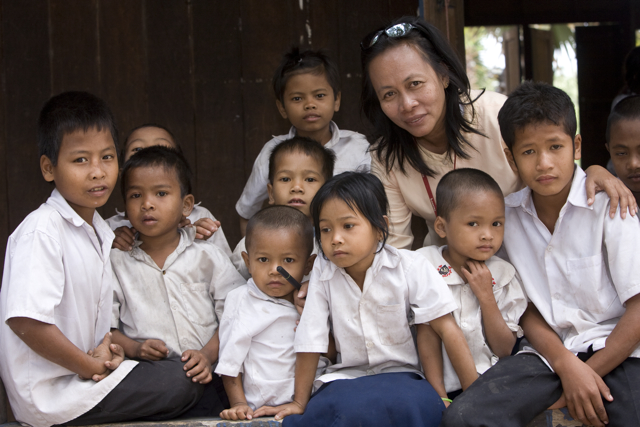
Ponheary Ly’s father was a well-respected high school teacher in Siem Reap, Cambodia, until the Khmer Rouge came to power in 1975 and began killing citizens showing any form of culture or intelligence in a massive genocide that didn’t end until 1979.
In 1975, soldiers forced Ponheary’s family into the countryside, and moved them from place to place, until 1977, when they imprisoned her family along with other families of teachers in an old pagoda. They forced them into hard labor with almost no food. Ponheary was 15 years old at the time. “They didn’t tell us anything. They just gave us a little rice each day,” Ponheary recalls.
In the end, her father was executed, and a sister died soon after. Over 200 of the women and children imprisoned with her also died. And elsewhere in the country, Ponheary lost 13 members of her extended family at the hands of the Khmer Rouge. Ponheary, her mother, grandmother, and five remaining siblings managed to survive.
Keeping Hope Alive
Afterward, instead of anger and vengeance, Ponheary sought healing through education. She would eventually–with the help and partnership of Lori Carlson in 2007—create the Ponheary Ly Foundation, an extraordinary organization that provides the support, infrastructure, and tools for poor, rural children to get a meaningful education, giving them the best opportunity for a bright future–for themselves, and in turn, for Cambodia.
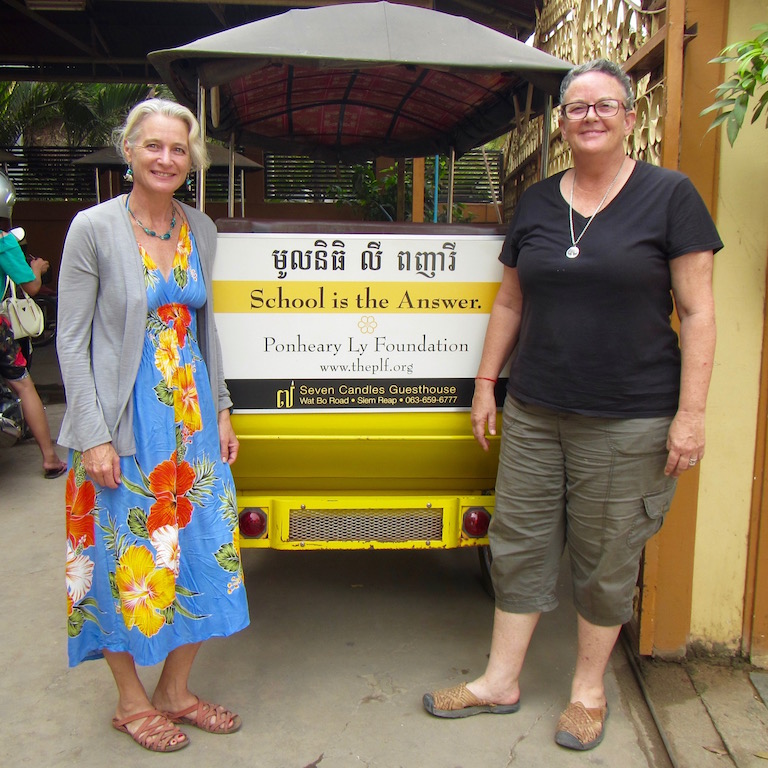
During our family’s visit to Siem Reap, I make arrangements to meet these two remarkable women and learn more about the work they do. Ponheary is the foundation’s Founder and Lori is its President.
They work out of the Seven Candles guesthouse, where they also teach computer classes. I meet Lori Carlson first, in the morning, and later in the day, I meet with Ponheary.
In speaking with Lori, I’m astonished to learn that the villages in which they have thus far focused their efforts are those with a high concentration of Khmer Rouge offspring. Lori explains that after the atrocities, Ponheary “needed healing in a place where there was none. So, she went to those communities, the Khmer Rouge ones, the most disenfranchised of all, and looked at the kids and said come with me… and try to undo something horrible.”
When I meet Ponheary later, I remark at the end of our conversation that I think Cambodia will change through education.
“I hope so!” she says. “We must always have hope! Otherwise, we hang in the tree.”
In the long journey that brought her here, Ponheary has never lost hope, not for herself and not for others.
Commitment to Teaching
After the Khmer Rouge dissolved, Ponheary wanted to become a high school teacher, just like her father, and attended teacher training school in 1983. She also studied Russian, earning a language diploma, and taught herself English and French, “in secret,” she says.
When Ponheary was to start a teaching job, she also got an offer from the UN in Siem Reap, which would pay well. “My mother really wanted me to take the job with the UN and I decided to do that, but as I rode my bike there, with my mind sleeping, my bike took me to the teaching job!”
Ponheary’s grandmother joked to her mother: “Her father’s blood is stronger than yours.” But Ponheary reassured her mother, “I can stay so strong because of [you].” In any case, Ponheary’s commitment to teaching was sealed.
Educating Poor Children
While Ponheary taught full time, because of her language skills, she also worked as a guide on weekends to earn extra money. At Angkor Wat and other temples she saw many young children selling trinkets and wondered why they weren’t in school. Wanting to create a better world for them through education, she saved her own money to help them buy the supplies they needed to stay in school.
“The poor countryside people; they need to be educated,” explains Ponheary. “I want to build a country! …The kids go to grade 1 or 2 and then they give up because they need supplies.”
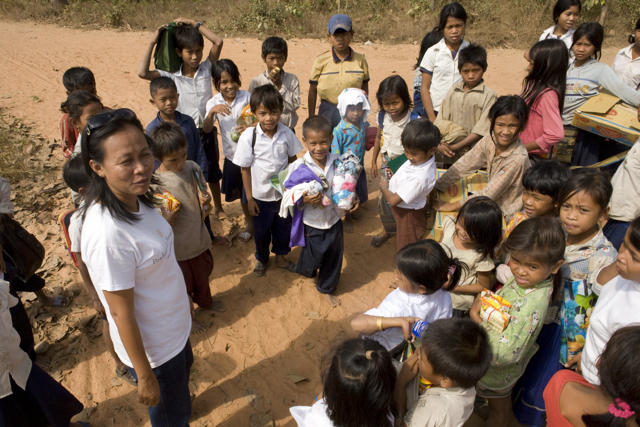
Although schools are free in Cambodia, uniforms and school supplies are not. Lori Carlson explains that it costs about $300/year for a child to attend school. People make about $80 to $100 per month for their whole families. Many don’t have enough money to eat, let alone pay for school supplies—among other challenges.
Little by little Ponheary began to help more children get the supplies needed to stay in school. She would go to the villages herself to see who needed help. “News spread, and those who didn’t think they could go to school, came. Before, grade 1 had mixed ages, but now grade 1 is only six-year-olds,” Ponheary says.
Ponheary also started asking tourists she guided for donations, requesting that they not buy trinkets from the kids but instead invest in their futures. That’s how, in 2005, Ponheary made a life-changing impression on one tourist visiting from Texas: Lori Carlson.
Inspiring Lori Carlson into Action
“She busted my insulated life,” Lori Carlson says. Lori came to Siem Reap in 2005 as a tourist. “It was my first trip to Southeast Asia, and it opened my eyes to things I didn’t want to see. I was living in privilege.”
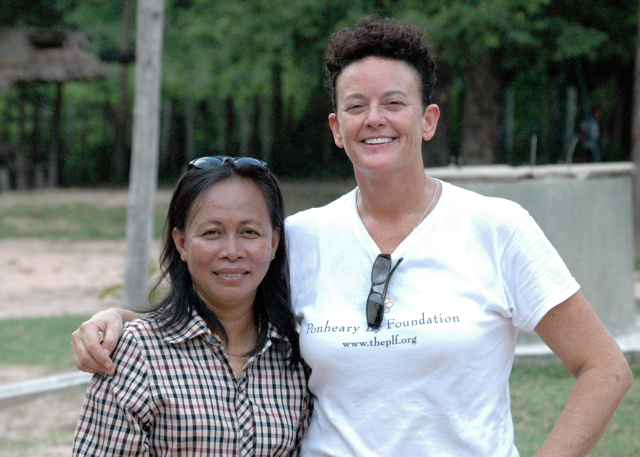
When she heard what Ponheary was doing for the kids and why, she reports, that “something in me fell apart; my little castle crumbled. She deconstructed everything I thought was correct….It really speaks to what one person can do.”
Lori went back to Texas deeply moved, and motivated. “I wrote the charter for our NGO [Non-Governmental Organization] on the plane home,” she says.
At first, Lori just wanted to build a vehicle in which to put her own money. “But Ponheary really needed help,” Lori explains. Lori thought at the time, Who would be willing to go to Siem Reap that cares as much about this work as I do, and who would be willing to do it for free?
Well, I would, she realized.
After taking the time to dismantle her life, in 2007, Lori left Texas to work with Ponheary in Cambodia. “I had an arrangement for the first year: I kept my house and job open. But after three months in Cambodia I knew I was not going back.”
Success!
The Ponheary Ly Foundation operated as a private foundation for the first two years, but in 2007 it became a 501(c)3 nonprofit.
Now that they had access to money, Ponheary and Lori thought about what they could really do. Already, the Ponheary Ly Foundation was supporting over 1,800 children at four primary schools in the Siem Reap province.
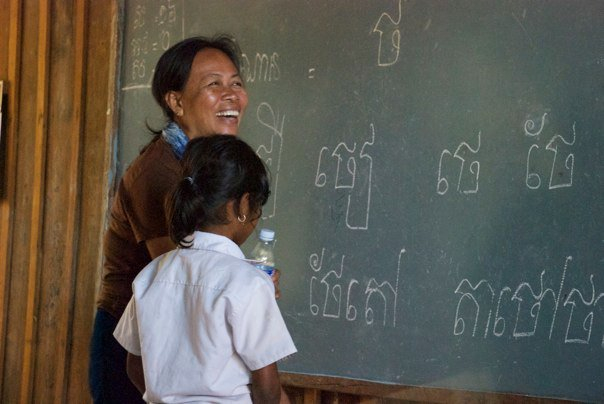
“We had to decide whether to go wide or deep,” Lori explains, meaning whether to help more primary school children get to school (wide), or to see the children they already supported stay in school through graduation and receive a meaningful, transformative education in the process (deep).
They decided to go deep and have been hugely successful. It has been about 12 years now, and the results are in: 87% of students supported by the Ponheary Ly Foundation graduate from primary school compared to 40% nationally! Most impressive: 47 students received scholarships to universities; 2 students passed the challenging exam to attend medical school (for which there are no scholarships; just the help of Ponheary Ly’s foundation); and 2 girls who showed an aptitude for math and science became–after a lot of push against prejudice–the first two females ever to be admitted to the National Polytechnic Institute in Phnom Penh. They are also seeing their first university student graduate.
These successes are flat-out astounding, especially when you consider the steep challenges that face keeping these students in school.
Overcoming Challenges
Lori explains, “Public school in the bush has many challenges: No access to clean water, teachers with only a 9th grade education, a population that is often sick.”
Additionally, parents didn’t go to school, so they don’t see the value of education. “There has to be a lot of “pull” for the kids to go, because there’s no “push” from the parents,” Lori explains.
And you have to feed them. “If kids are worried about where their next food is coming from, they’re not going to focus on learning,” Lori says. So, they feed the kids first, and then they make school fun with stimulating activities, such as chess club, a robotics class, and a media lab, to name a few.
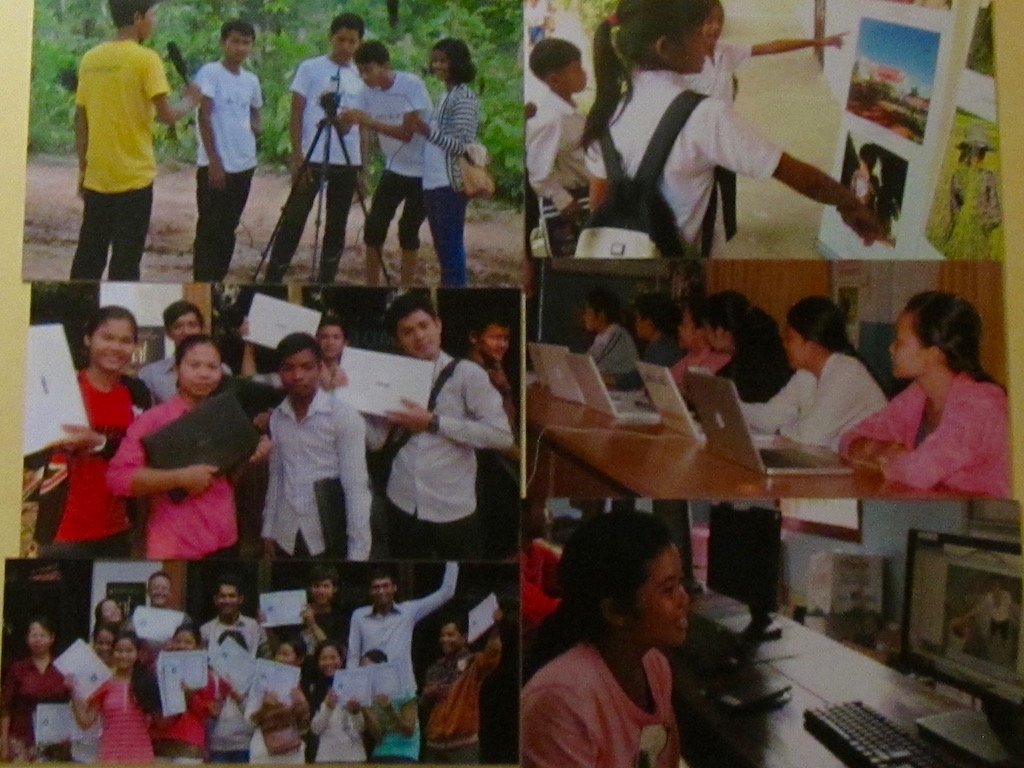
“We want to create a fire in their bellies for education,” Lori explains. But the foundation also seeks to make their time in school meaningful. “More than sitting in a classroom, students need to think critically and gain the skills needed.”
Another challenge: Finding qualified teachers, which is made more difficult when you consider that most of Cambodia’s intellectuals and professionals were wiped out. Because of this, the foundation also helps teachers advance their own skills.
Finally, one of the biggest challenges is just getting kids to the schools. In rural Cambodia, where 80% of the population resides, primary schools are accessible in villages, but secondary schools are 10 to 15 km. away, and high schools (grades 9 to 12) require a three hour drive! The foundation’s solutions: they provide bicycles so that kids can attend secondary school, and then set up dormitories in Siem Reap so they can go to high school.
Lori notes, though, that the foundation can only bring students to the dormitories who do well on the grade 9 exam, those who are university material. “The vast majority of students [alternatively] return to their village and work, and several of them come to Siem Reap for one year to attend vocational school.”
The success of the students has changed the tide of support from parents and families. They are extremely proud, and students become a positive example for their villages. (As is customary, children who work often send money home to their families.)
Ponheary tells the story of one student who wanted to come to Phnom Penh for university, but her family did not support her. “Her parents said, ‘Choose between the foundation and your family.’ I told her, ‘No, choose between a hard life and a bright future.’ And she makes it to year four! Now it’s changed. The family is proud of her. They dropped one small bag of rice for [us to take to her] in Phnom Penh.”
Financing Dreams
Ponheary reflects on how the students develop as they advance: “At first the children play. But now we get them to high school, and their brains start to work. They ask themselves, Can I do this? Or that? Is this possible? Is that possible? Now, we just look for money to fulfill their dreams. We support 2,800 students! We are very happy to do it and happy to follow them. There is no stress at all. It’s a fulfilling life. We swim in happy dreams.”
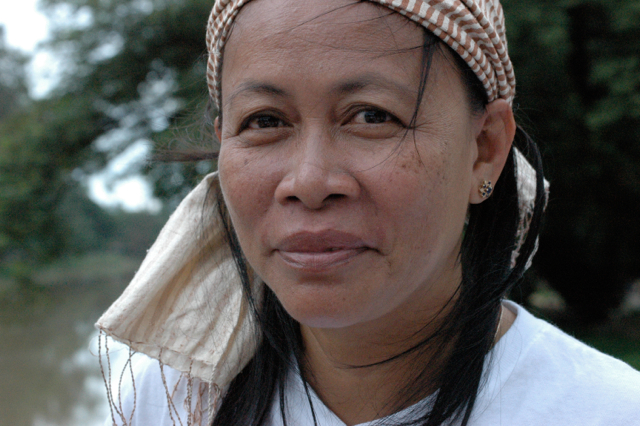
Later in our interview, I ask Ponheary about her own dreams. “If you asked me 10 years ago, I would tell you a lot about what I want to do. Now, I don’t have a dream; I just follow the children’s dreams!”
“This generation is very brave,” she continues. “The class next door, they are smarter than me, and they have big dreams. Dreams bigger than their families’ capacities.”
Ponheary tells another story of asking a four-year-old what he wants to be when he grows up. A doctor, he told her. Ponheary asked him why and he said, “Because my parents died without treatment. I don’t want anyone else to die.”
The boy went on to study IT in the foundation’s media program. “He is smart and won $10,000 for his film. We asked him if he wants to go into IT or journalism. But he still wants to be a doctor.”
There are no scholarships for medical school, which takes eight years, and the entrance exam is tough. Ponheary says, “It’s oh my god if he fails, because he doesn’t get his dream, and oh my god if he passes, because we have to pay for it!” Ponheary and Lori decided to support him, and, as Ponheary tells it, “he passed the exam for the best school!”
This is how the foundation operates: “We just do it [support the kids]. However much we can we just do it from our hearts,” Ponheary says.
Vision for the Future
When I ask Lori what’s next, she says, “We’re going to scale up. There’s no more deep to go; it’s time to go wide.” They are also building a team to help.
I ask Ponheary about her vision for the future. “To be retired,” she tells me. “And that time will come when all the children are graduated and have a good future and have their families.”
I assume she means all the children in her program, but she might also mean all the children in Cambodia. She wanted to build a country, and through her foundation, she’s doing it.
Learn More
To learn more about the Ponheary Ly Foundation and what they do, see the following links:
- Ponheary Le Foundation website.
- A short video about the Ponheary Ly Foundation, made by students in their media lab.
- Inspiring article about the first two females ever to attend a technical university in Phnom Penh.
- A short video about standing up for girls, made by students in their media lab.
To DONATE, please visit this link.
To VOLUNTEER, please visit this link.
This blog post is copyrighted (c) 2016 by Cindy Bailey Giauque and is an original publication of www.mylittlevagabonds.com. Please join us on Twitter and Facebook. Happy travels!
What a beautiful story. Thank you so much for sharing it.
Thank you, Betty!
Ponheary was our outstanding guide in Siem Reap. We still send $$$ every year for bicycles as our Christmas gift to each other. We saw those bicycles at work! Also had interesting discussions with Lori who made quite a commitment, and changed her life! Reading this article will brighten your day. Nancy and Hank
Hi, Nancy and Hank – Thank you for sharing that. We are so impressed and inspired when we meet people like Ponheary and Lori in our travels. They make such a difference in the world. How wonderful that you contribute funds for bicycles as well! All the best to you.
Terrific summary of all that Ponheary and Lori are doing. I’m lucky to have known them for many years; their accomplishments are amazing.
Thanks, Lucy. They are truly remarkable human beings.
I am so excited you guys made it to Lori and Ponheary. It is a remarkable difference those two are making. Thank you for bringing more exposure to this effort. Safe travels and many blessings to you and your family!
Thank you, Tara!
What an inspiring article. It leaves me without words. Bicycles… whom would have ever thought of how… one attends school, let alone having enough food. I will share this article with my children. I would like them to truly understand what they have.. Perhaps it is only clear with a trip to such a place, for them to actually comprehend. What a valuable education your children are receiving, in such a short time, to understand life wholly.
Renee Frisbie
Thanks, Renee! Ponheary and Lori are doing amazing work in this world! We always bring the kids along to visit people and organizations like these to help teach them gratitude. Unfortunately, it still doesn’t phase them how good they’ve got it. I think everything does sink in, though, and the gratitude will come in later. For now, we just repeat the lessons…